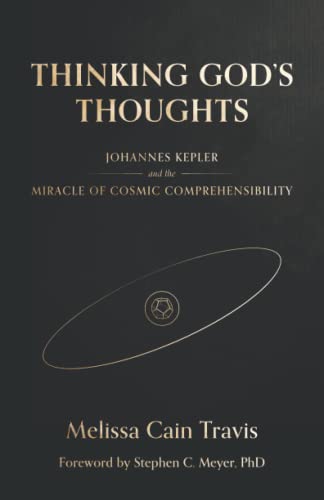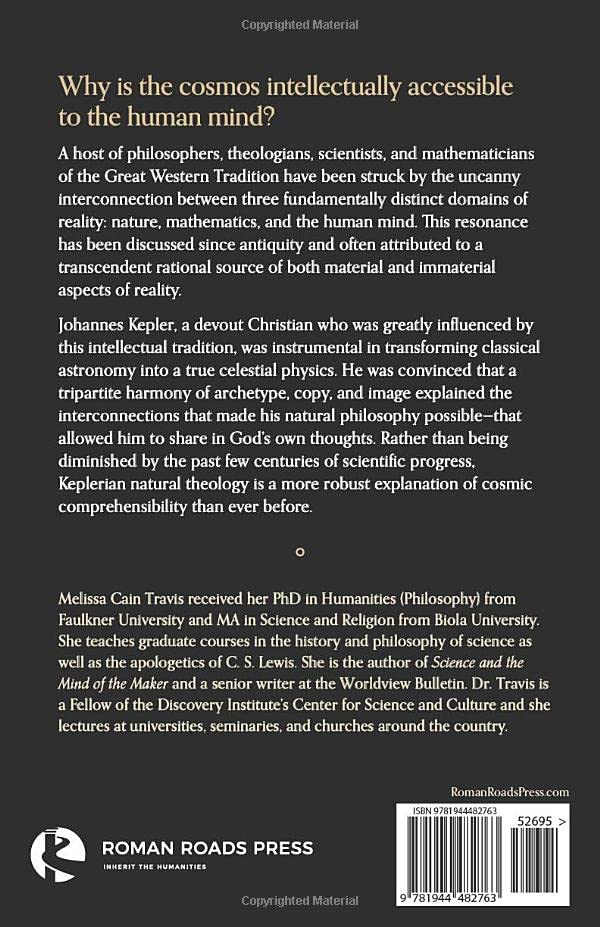


Thinking God's Thoughts: Johannes Kepler and the Miracle of Cosmic Comprehensibility
R**S
Great book on Christian philosophy and the philosophy of science.
Thinking God’s Thoughts is highly recommended for those interested in the relationship between Christian philosophy and the philosophy of science.The early chapters trace the history of Pythagorean philosophy, and its further development by Plato. It includes a good summary of Aristotelian-Ptolemaic (earth centered) cosmology, which was the dominant view of cosmology for 1500 years. The development of this cosmology continued through the Middle Ages, until Copernicus proposed the heliocentric cosmology.The book also includes a discussion about the relationship between Platonic thought and early Christian theology. Throughout the narrative, Cain Travis describes how many key scientists associated with the scientific revolution, including Copernicus, Galileo, Newton and Kepler, viewed their concept of cosmology as being designed by God.The majority of this discussion centers around Johannes Kepler, who “believed there to be a special resonance between the mind of man and the mind of God regarding mathematical order and harmony and that this could serve as an a priori guide in the investigation of nature.” Kepler believed that there is a tripartite harmony relating the mind of God to the mind of man by way of the created order. Cain Travis explains how Kepler’s philosophy is also consistent with Pythagorean-Platonic philosophy. As it relates to the science of astronomy, Kepler’s substitution of physical forces for purely geometrical cosmologies of the early astronomers was revolutionary.Cain Travis explains that “Part of the central thesis of this book is the claim that Kepler’s tripartite harmony of archetype-copy-image remains a superior philosophical explanation for the mathematical structure of nature and the human ability to discern it.” There has been a debate over whether mathematics has been invented or discovered. Several scientists support the discovery position, including physicist Eugene Wigner (an agnostic) who wrote, “The enormous usefulness of mathematics in the natural sciences is something bordering on the mysterious. There is no rational explanation for it.” The competing hypothesis based on the philosophy of naturalism is that mathematics exists within the human mind only as the result of the evolution of the human brain. The book makes a strong case that it was designed by God, and was discovered by humans.The book also examines the origin of rationality in general and argues that Christian theism provides a better explanation than does naturalism, concluding that, “It is quite difficult to see how a naturalistic conception of human reason could ever explain the sciences, which depend upon free mental deliberation in acts of mathematical and logical reasoning.”
D**T
Lovely!
Melissa Cain Travis’s latest book is a treasure trove of insight, illuminating the evidential significance of the “unreasonable effectiveness” of mathematics, a source of great fascination. Laudably lucid and clear, and deeply interdisciplinary, it traces the philosophical and theological moorings of the scientific revolution, weaving a brilliant narrative from strands too often ignored. She deftly navigates a vast swath of intellectual history—canvassing insights from philosophy and theology, mathematics and science—to isolate a central integrating thread in the groundbreaking innovations of Johannes Kepler. Not just that, she then extends the discussion to argue persuasively that Kepler’s animating natural theology remains a powerful explanatory paradigm today, one worth our most serious consideration. The book is a prodigious achievement, well worth your time, and a delight to ponder: a must-read for anyone tempted by the charming if misguided notion that science and robust faith are at odds or in any way in tension.
Trustpilot
5 days ago
1 month ago